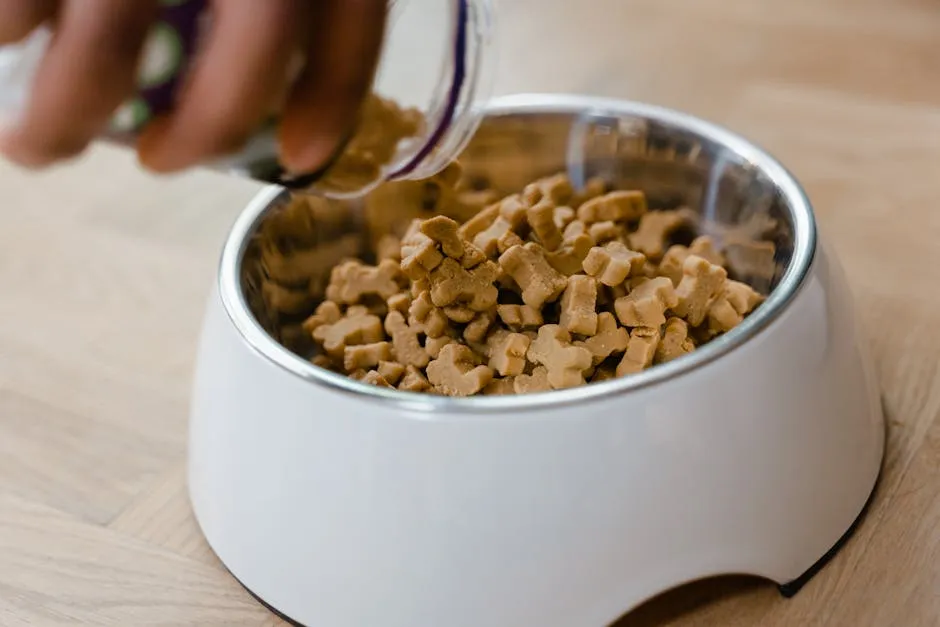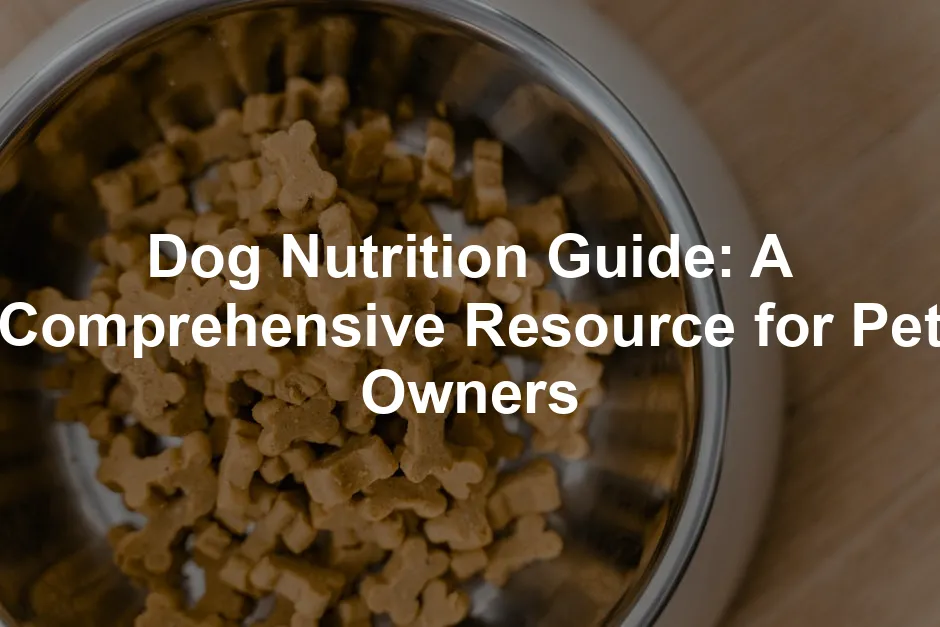Introduction
Proper nutrition is vital for your dog’s health and happiness. It impacts everything from energy levels to behavior. With countless dog food options on the market, how do you choose? Many pet owners feel overwhelmed by the choices available. This guide aims to simplify that process. We will provide you with essential insights into dog nutrition. Our goal is to help you make informed decisions for your furry friend.And speaking of choices, if you’re looking for a practical way to feed your pup, check out this Dog Food Bowl Set. It’s not just a bowl; it’s a dining experience for your beloved furball!
Summary and Overview
A balanced diet for dogs includes six key nutrients: proteins, fats, carbohydrates, vitamins, minerals, and water. Each plays a crucial role in maintaining health. Understanding your dog’s nutritional needs is essential at different life stages. Puppies, adults, and senior dogs require distinct diets. Puppies need more protein for growth, while senior dogs often require fewer calories.
Understanding Dog Nutrition
Essential Nutrients for Dogs
To keep your dog healthy, it’s crucial to provide a balanced diet. There are six essential nutrients every dog needs: proteins, fats, carbohydrates, vitamins, minerals, and water. Proteins are vital for building and repairing tissues. They help maintain muscle, skin, and coat health. Fats provide energy and support cellular functions. They also help absorb vitamins. Carbohydrates supply energy and aid digestion. They can be found in grains, fruits, and vegetables. Vitamins are necessary for various bodily functions. They play roles in immune function and skin health. Minerals are important for bone health and overall bodily processes. Lastly, water is essential for hydration and nutrient absorption. Statistics show that many dogs suffer from nutrient deficiencies. For example, protein deficiency can lead to muscle loss and weakened immune systems. Ensuring your dog receives all these nutrients is key to their long-term health. Regular check-ups with your vet can help identify any potential deficiencies early.
For those furry friends who need a little extra boost, consider adding Dog Vitamins and Supplements to their routine. It’s like a multivitamin but for dogs – because why should humans have all the fun?
Choosing the Right Dog Food
When selecting dog food, consider the various types available: dry kibble, wet food, semi-moist, raw, and homemade diets. Dry kibble is popular for its convenience and dental benefits. It helps reduce plaque and tartar buildup. Wet food often appeals to picky eaters and provides higher moisture content. Semi-moist food is easy to digest but can be less nutritious. Raw diets mimic a dog’s natural eating habits but require careful preparation to avoid health risks. Homemade diets allow control over ingredients but need to be balanced to meet nutritional needs.
Reading Dog Food Labels
Understanding dog food labels is essential for making informed choices. Start by checking the ingredient list. Ingredients are listed in order of weight. Look for specific meat sources at the top, like chicken or beef. Avoid vague terms like “meat by-products” or “animal meal.” Nutritional information is also crucial. This includes protein, fat, fiber, and moisture percentages. AAFCO statements indicate if the food meets necessary nutrient standards. Look for phrases like “complete and balanced” for reassurance. Beware of misleading terms. “Natural” doesn’t always mean healthy, and “premium” labels can be subjective. Terms like “grain-free” might seem beneficial but can lead to nutritional imbalances. Always do thorough research to ensure your dog gets the best nutrition possible.
Nutritional Requirements by Life Stage
Puppy Nutrition
Puppies have unique dietary needs. They require more protein and calories than adult dogs. This supports their rapid growth and energy levels. For puppies under six months, feed them three to four meals daily. As they grow, you can gradually reduce to two meals. Portion sizes vary based on breed and size, so refer to feeding guidelines on the food package. Key nutrients for puppies include DHA for brain development, calcium for bone health, and essential vitamins. High-quality puppy food is formulated to meet these needs, ensuring your furry friend thrives during this critical growth phase.
To make mealtime even more exciting, consider adding some High-Quality Dog Food (Puppy Formula). It’s like a gourmet meal for your little one, ensuring they grow up strong and healthy.
Adult Dog Nutrition
Adult dogs have diverse nutritional needs based on their breed and activity level. Active dogs need more calories and protein compared to less active ones. Generally, adult dogs should be fed twice daily. Adjust portions according to their weight and overall health. Maintaining a healthy weight is vital. Overweight dogs face serious health risks, including joint issues and diabetes. Choose high-quality dog food that matches your dog’s lifestyle. Look for balanced proteins, healthy fats, and essential vitamins. Regular vet check-ups can help tailor their diet as needed.
Senior Dog Nutrition
As dogs age, their nutritional needs change significantly. Senior dogs often require diets with fewer calories. This helps manage their weight, as metabolism tends to slow down. Additionally, joint support becomes crucial. Ingredients like glucosamine and omega-3 fatty acids can support joint health. Common health issues in senior dogs include arthritis, obesity, and dental problems. To manage these, consider diets enriched with antioxidants, fiber, and dental health ingredients. These can aid digestion and promote overall well-being. Feeding strategies for older dogs should focus on smaller, more frequent meals. This approach can help with digestion and reduce the risk of bloat. Monitor your senior dog’s weight closely and adjust portions as needed. Regular veterinary check-ups will help ensure their diet meets changing health requirements.
Special Considerations in Dog Nutrition
Common Myths about Dog Nutrition
Many misconceptions surround dog nutrition. For instance, some believe that all protein sources are equal. In reality, animal proteins provide essential amino acids better than plant proteins. Another myth is that raw diets are always the best option. While they can be beneficial, they also carry health risks. Cooked diets can be safer and more digestible for many dogs. Understanding these myths helps pet owners make informed decisions about their dog’s diet.
Food Allergies and Sensitivities
Food allergies can be a concern for many dogs. Common signs of food allergies include itching, skin irritations, and gastrointestinal issues. You might notice your dog scratching excessively or experiencing stomach upset after eating. These symptoms can indicate that your dog may be reacting to certain ingredients in their diet. To identify dietary issues, keep a food diary. Document what you feed your dog and note any changes in behavior or health. An elimination diet can also help pinpoint allergens. This involves removing potential allergens from their diet for a few weeks and then reintroducing them one at a time. Consult your veterinarian for guidance during this process. Hypoallergenic diets are specifically formulated to minimize allergic reactions. These diets often use novel protein sources, such as duck or venison, and limited ingredients to reduce the risk of allergies. If you suspect your dog has food sensitivities, a hypoallergenic diet may be a suitable option to discuss with your vet.
Managing food allergies is crucial for your dog’s well-being. You can learn more about this in our article on understanding and managing dog food allergies. And while you’re on the topic of health, consider a Pet First Aid Kit for emergencies. Because when it comes to our furry friends, it’s better to be safe than sorry!
The Importance of Hydration
Water plays a critical role in your dog’s overall health. It supports digestion, nutrient absorption, and temperature regulation. Without enough water, dogs can quickly become dehydrated, leading to serious health issues. Daily water intake requirements depend on your dog’s size and diet. On average, dogs should drink approximately one ounce of water per pound of body weight. For example, a 20-pound dog needs about 20 ounces of water daily. If your dog primarily eats dry kibble, they may need more water compared to those on a moist or raw diet. Always ensure your dog has access to fresh, clean water throughout the day.
To make hydration easier, consider a Pet Water Fountain. It encourages your dog to drink more water, keeping them hydrated and happy!
Conclusion
A balanced diet tailored to your dog’s individual needs is crucial for their health. Proper nutrition can significantly enhance your dog’s quality of life. Stay informed about your dog’s dietary requirements and consult professionals for guidance. By prioritizing nutrition, you contribute to your furry friend’s happiness and longevity.And don’t forget to reward your pup for being so awesome! Check out these Dog Treats (Training Rewards) that’ll have their tails wagging!
Please let us know what you think about our content by leaving a comment down below!
Thank you for reading till here 🙂
All images from Pexels





